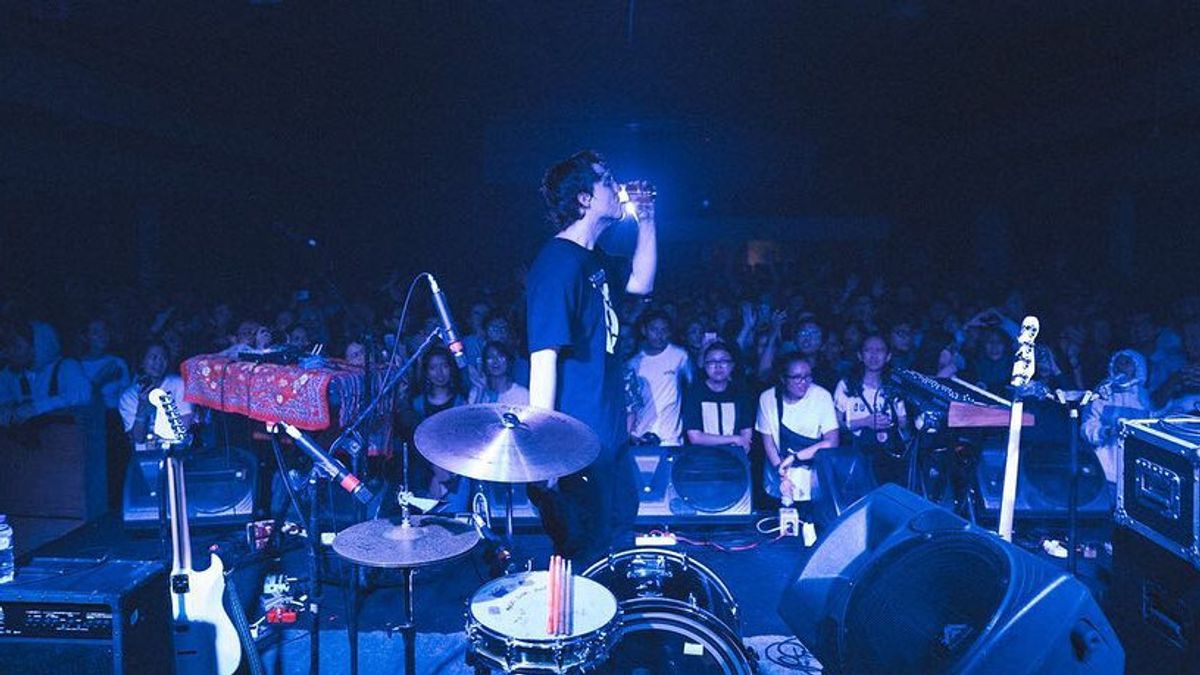Call concerts and music festivals an industry. So, this industry is just starting to be built. The 2019 Lokatara Fest, which failed to bring in six headliners, to Musikologi which led to acts of destruction and arson by unscrupulous spectators, are perhaps the stages that must be passed. Of course, don't just go through. This industry has to learn. All perpetrators need to improve. This is the final article in VOI's signature Writing Series, "Delaying Musical Events." Let's take a full look at this issue.
A week since the 2019 Lokatara Fest failed to bring in six of its headliners on November 23, another music festival entitled Musicology 2019 also experienced disaster last weekend. The dragged event caused the two main performers, Fourtwnty and Feel Koplo to fail to get on stage. As a result, the audience was furious. The vandalism and arson closed the music show initiated by a group of university students. Previously, the Jakarta Rock Space distortion party and several concerts --Ari Lasso and GIGI - were also canceled.
Argia Adhidhanendra's name immediately came to mind when the chaos started. Argia is the founder of Noisewhore, a music collective that is quite responsible for infecting the spirit of cultivating music among young people. If we look at the development of this industry, we will see how the Fazerdaze concert in 2017 has triggered the proliferation of other medium-scale music events in the Capital City. In fact, the virus that Noisewhore transmits is not bad. However, the extraordinary movement in this industry is unfortunately not accompanied by good education.
Argia highlighted a number of things. First is the curation trend called YouTube-core which is also mushrooming around the industry. YouTube-core is a term - if you don't want to be called a new sub-genre - to describe musicians who are watched and heard a lot on music streaming platforms, including Spotify, Deezer, and YouTube. Not completely wrong. Various streaming data collection applications certainly make it easier for music show organizers to read the market. However, YouTube-core became a disease triggering burnout when implemented by all organizers.
Simple. When organizers see the same data, their chances of bringing in performers' names from alternative cars are getting smaller. Diversity again failed to materialize. In fact, Argia himself started Noisewhore's work with independent curation which even tended to be personal. That doesn't mean you don't know streaming data collection devices and applications. However, Noisewhore keeps their curation scheme based on personal preferences. That idealism, for Argia, is able to maintain Noisewhore's muruah as an alternative provider in music performances.

"Yes, even though the people change, but the curation is mostly from me. Only, I always ask the kids, like 'Do you like me?' There are some artists that I really like, kids say no. But, usually I throw ideas, "said Argia when VOI met at MBloc Space, Blok M, South Jakarta, Wednesday, November 27.
In addition to increasingly narrow options, the YouTube-core trend has also caused the price of middle-class musicians from overseas to be damaged. The similarity of data encourages music event organizers to scramble for musicians to be brought in. This caused the war bidding process to get tighter. This condition is used by agents from foreign middle class musicians to play prices. For Noisewhore, who started work without extra funds, this case is clearly a difficult one. Moreover, Argia admitted that he was anti-sponsor. It's tough when faced with reality. However, Noisewhore chose to face the consequences.
Argia, of course, spoke from the organizer's side. From the musician side, we met Eet Sjahranie. The legendary rock band frontman Edane is definitely the right person to talk to. Since the 90s, he has been poor across the music stage. The number of concerts or festivals that he explores is not so much. The number he no longer remembers when we asked him. From his point of view, Eet criticizes the way music event organizers maintain relationships with musicians. In Eet's eyes, so many music organizers today see bands as mere commodities. No more ethics.

"Whereas in the past (the organizers) were whining asking us to help play at the event ... Then, (now) they are negotiating for example. Our prices are low, for example, they are bargained for free because they feel we need the stage. Actually bargaining is natural. The condition is like that, if at first you asked for help, it's a different story, boss. And many are like that now, "said Eet when met by VOI at his residence in Cimanggis, Depok, West Java, Thursday, November 28.
Even worse, Eet also talked about how many organizers were too inferior. The differences in the way the organizers treat local bands with international bands, for example. Not an unfounded comparison. Eet also realized that the privilege was a blessing for big names international bands who had already started the industry. However, building a domestic industry with an inferior attitude is clearly wrong. And if many music organizers cite their movement as support for local musicians, Eet's statement should make sense.
Do not allow colonization in this industry. Colonialism which ironically was carried out by the nation's own children against the children of other nations. Colonialism which unfortunately began when this industry was just being built in the country. "I do not understand where the problem is. Only, most of us are foreigners who ask, nod ... Colonialism, indeed. That's the language I really want to convey," said Eet.
The two-eyed knife is called sponsor
One thing that Argia and Eet might agree on is the involvement of sponsors in the music industry. Both of them describe the sponsor as a double-edged knife. On the one hand, sponsorship can accelerate industrial development. However, on the other hand, actually sponsors are also the ones that consciously or unconsciously become an obstacle to industrial development.
In Argia's eyes, sponsorship is an obstacle for the music industry to develop naturally. Indeed, sponsorship increases the ability of organizers to bring in musicians and hold higher quality events. However, given the emerging industrial situation, sponsorship has the potential to obscure the larger interests of education.
The education in question is how music show organizers curate their musicians. The presence of sponsors will more or less affect the curation of a music event. From this point of view, the goal of introducing music to a broader scene can be hindered. Others, the presence of sponsors at this early stage will reduce the independence of music organizers to hold their own celebration. In fact, many players in this industry still need a lot to learn.
"In my opinion, (ideally) come back again, not using people's money ... People should know that playing artists is not easy. Strategically I can predict FnB more than music. Because no one knows," said Argia. a process that every music organizer must go through.
From the Eet side, the presence of sponsors has an even wider impact. The culture of watching music in Indonesia is now increasingly sagging in Eet's eyes. Since the era of rampant sponsorship, Eet often meets free concerts or music festivals. For Eet, this is bad for the music industry. An ecosystem that involves spectators, organizers and musicians loses the symbiosis of mutual benefit that had actually been established in the '90s.
"Since joining the sponsorship, there have been more and more free music events. I can't say that this is completely wrong, huh. But, the ecosystem is actually important. How do the audience pay to watch entertainment," said Eet.
From the audience side, the free program will disturb education about music. The audience will no longer know which music is good and what is not. The consideration of someone watching music shows later is no longer based on taste but based on what is free and what is not. From the organizer's side, as said Argia. Sponsorships will hinder the natural development of music event organizers. From a musician's perspective, a free sponsored event will take away the passion and responsibility of musicians on stage.
"Try an outside band. If they play at one event, the audience pays, if they play badly, it can be cursed at, boss. 'Well, we've already paid,' I see. Well, if it's not here, it's free. The musicians are sure to be, 'Well, play as it is. The program is free too, right? ”said Eet about the psychological side that can affect musicians.
Face chaos
Despite all the chaos, the players in this industry must not give up. Keeping the spirit on is obviously important. The absence of the six Lokatara Fest 2019 headliners is not the end. The burning of a number of event support facilities in Musicology 2019 should not be a destroyer of enthusiasm. The most important thing is to learn from mistakes. Realizing that this industry is just emerging, there are clear points to remember.
The process may be difficult. The psychological impact to material loss cannot be denied. But, what other choice but to face this mess. Even in a bitter way, for example. Like it or not, organizers such as Lokatara Fest 2019, Musikologi 2019, or Jakarta Rock Space have to bear real consequences. The consequence will encourage organizers to learn from mistakes.
#musikologi the most bad gigs ever pic.twitter.com/XlC9nuuUvI
- Bebeb ku (@Sabrinaslsbilaa) December 1, 2019
From a musician's perspective, drafting a contract in a professional manner is mandatory. Every musician should start entering a cancel fee agreement - or some other form of consequence - to avoid the risk of losing money from canceling a music show. Chairman of the Agency for Professional Advancement and Inter-Institutional Relations IMARINDO (Association of Indonesian Artist Managers) Luthfi said what causes a music show to be canceled is usually an administrative matter.
IMARINDO itself sets a special penalty for event organizers (EO) who unilaterally cancel the event in the contract clause of each artist they shade. "The money that has entered is our right, and the promoter is obliged to pay off the rest of the payment. To book a new schedule, we have to pay again. If the cancellation involves force majure, it must be accepted by the promoter and artist," said Luthfi to VOI. , Friday, 29 November.
"The clause used is then included in the cooperation contract which is an agreement of two parties, the draft contract is prepared by the legal division of both parties, coupled with the existence of a stamp duty, it strengthens both parties' legal positions (formal juridis)," added Lutfi.
In addition to the process of dealing with chaos, building the right spirit also needs to be nurtured in the heads of every organizer. Money is important. However, it should not be possible that the well-developed ecosystem between the audience, organizers and musicians is damaged by profit orientation. Do not start with the wrong attitude, such as inferiority, as told by Eet. It remains important to start with local musicians.
Follow the Writing of this edition of VOI's signature Series: Disturbing Musical Events
The English, Chinese, Japanese, Arabic, and French versions are automatically generated by the AI. So there may still be inaccuracies in translating, please always see Indonesian as our main language. (system supported by DigitalSiber.id)













